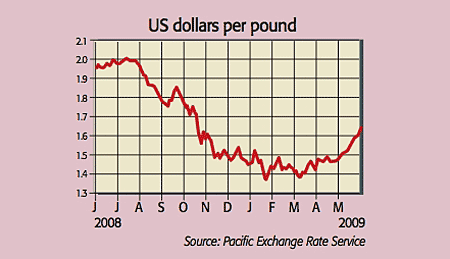
“Violent market actions often lead to equally violent reactions,” said Dominic Picarda on Investorschronicle.co.uk. Having slumped to a 23-year low against the greenback in January, sterling has gained 20% in less than three months and now stands at a seven-month high of around $1.67. May’s 9% rise was its best monthly showing against the dollar since 1985. Meanwhile, it has climbed from near-parity against the euro to over €1.16 in six months.
What the commentators said
Sterling is a “cyclical currency” that benefits when global risk appetite is high, said Ian Stannard of BNP Paribas. Improving data across the world has bolstered confidence that the worst of the financial crisis and economic downturn is over. Sterling has benefited disproportionately from renewed bullishness about the global banking sector and Britain’s large dependence on financial services. It is “basically a bet on global financial well-being”, said Geoffrey Kendick of UBS.
Sterling has also been helped “indirectly” because the dollar has lost safe-haven appeal as the risk rally has strengthened, noted Capital Economics. Meanwhile, for all the bad news on the UK economy, “things are just as bad elsewhere”.
For instance, expectations for 2009 GDP growth have shifted in favour of Britain relative to the eurozone this year, bolstering the pound against the euro.
A similar argument applies to the public finances: they’re in an “awful mess”, but “it’s not as if the UK is out on a limb”. Four eurozone members have been downgraded and now the spotlight is on America.
Combine political turmoil with the sea of red ink in the public finances, and you ought to have a “recipe for a sterling crisis”, said Hugo Dixon on Breakingviews. But investors reckon that the upheaval has increased the chances of an early election. The Tories look well placed to win, and since David Cameron has been “talking tough about reining in” the fiscal deficit, the hope is that he’ll be able to tackle it – although we are still waiting for details of his plan.
What next?
If the rally in global markets goes into reverse as jitters return, the pound is likely to fall back against the dollar. For now, though, the rally against the greenback is “gaining momentum”, according to Roberto Mialich of UniCredit.
The pound is still well below its long-run average in trade-weighted terms. That’s not true of the euro; with the growth outlook worsening in the eurozone, said Capital Economics, there is scope for sterling to hit €1.25.